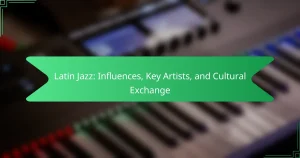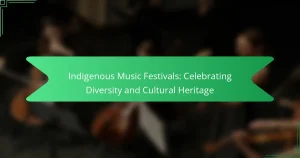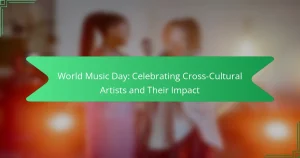Cultural fusion music events offer unique experiences that reflect global trends and promote inclusivity. They blend traditional and contemporary styles, showcasing diverse musical influences. These events drive innovation, inspire new sub-genres, and enhance cross-cultural collaboration among artists. Additionally, they significantly boost local economies and adapt to changing audience preferences through technology and interactive experiences.
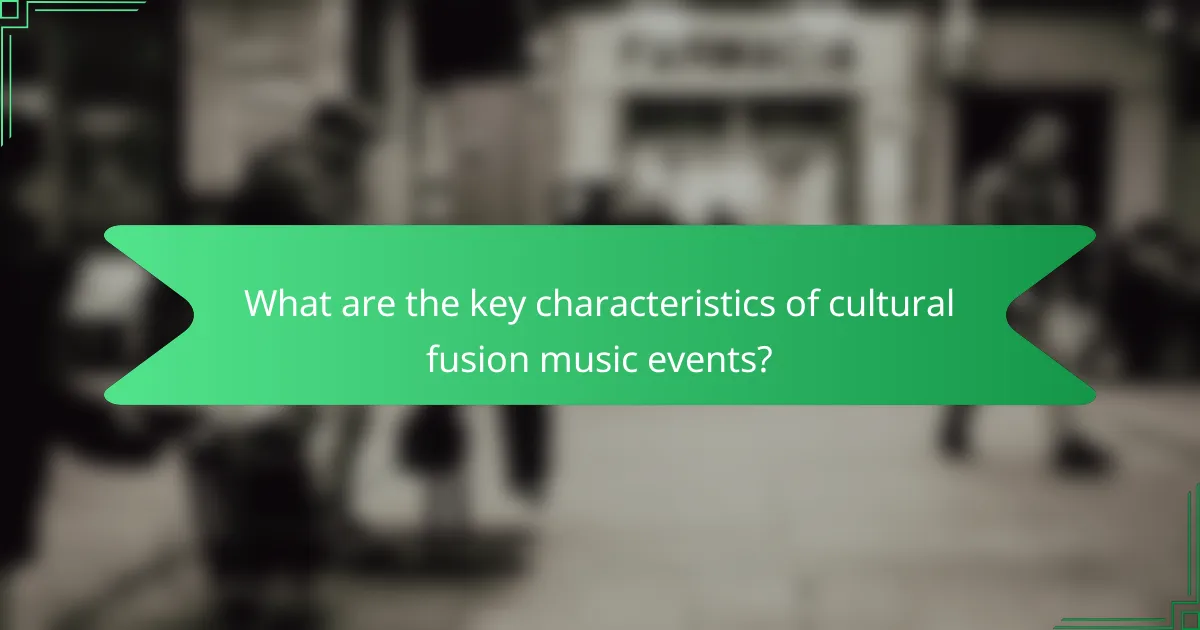
What are the key characteristics of cultural fusion music events?
Cultural fusion music events are characterized by diverse musical styles, collaborative performances, and cultural exchange. They showcase a blend of traditional and contemporary influences, creating unique experiences that reflect global trends. These events often feature artists from various backgrounds, promoting inclusivity and creativity. Additionally, they serve as platforms for social change, raising awareness about cultural issues through music.
How do cultural fusion music events promote diversity and inclusion?
Cultural fusion music events promote diversity and inclusion by celebrating various cultural expressions. These events create platforms for artists from different backgrounds to collaborate, fostering mutual respect and understanding.
Such gatherings often feature diverse genres, allowing attendees to experience a rich tapestry of sounds and traditions. This exposure encourages dialogue and connection among participants, breaking down cultural barriers.
Additionally, cultural fusion music events can drive community engagement by involving local artists and audiences. This involvement strengthens social bonds and promotes a sense of belonging. As a result, these events contribute to a more inclusive and harmonious society.
What role do local communities play in shaping these events?
Local communities significantly influence cultural fusion music events by providing unique perspectives and diverse traditions. Their participation enriches the musical landscape, fostering collaboration among artists. Community-led initiatives often highlight local sounds and styles, creating a distinctive atmosphere. Additionally, local audiences shape programming choices, ensuring events resonate with cultural identities. This grassroots involvement cultivates a sense of ownership and pride, enhancing the overall experience for attendees.
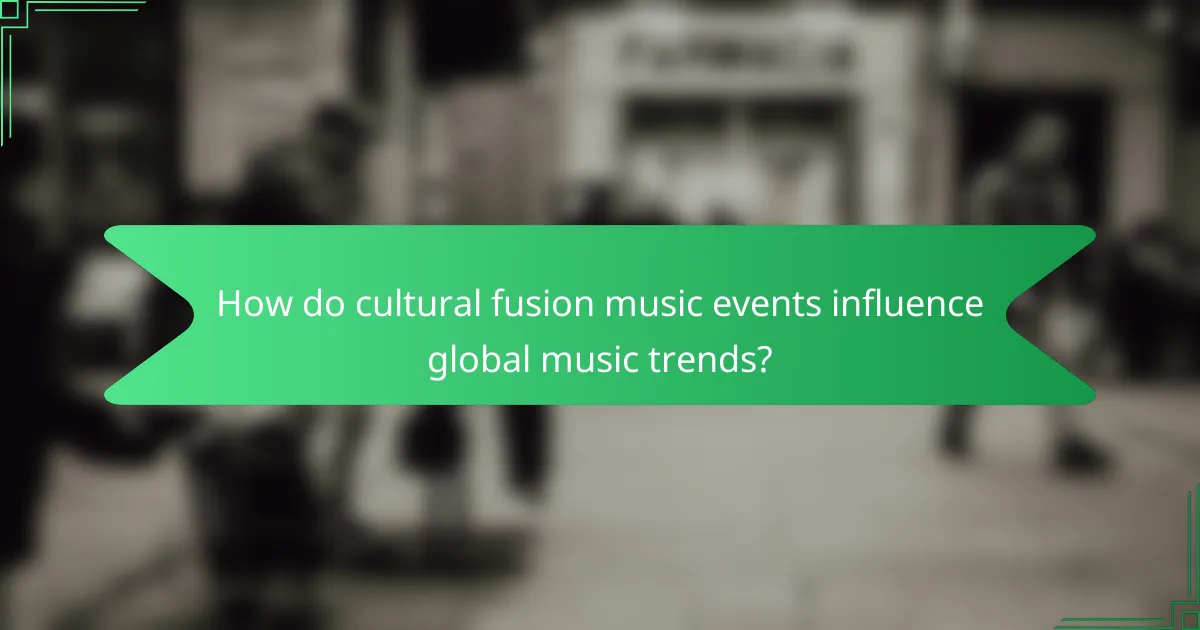
How do cultural fusion music events influence global music trends?
Cultural fusion music events significantly shape global music trends by blending diverse musical styles and cultures. These events create unique sounds that influence mainstream music and inspire artists worldwide.
The incorporation of various genres fosters innovation, leading to the emergence of new sub-genres. For instance, the fusion of traditional African rhythms with contemporary pop has resulted in the rise of Afrobeats, which has gained international popularity.
Moreover, cultural fusion music events promote collaboration among artists from different backgrounds, enhancing cross-cultural exchange. This interaction not only enriches the music but also broadens audiences’ perspectives on global music.
As a result, cultural fusion music events play a crucial role in redefining musical landscapes, driving trends that resonate across borders and cultures.
Which genres are most commonly blended in these events?
Cultural fusion music events commonly blend genres such as reggae, hip-hop, jazz, electronic, and traditional folk music. These combinations create unique soundscapes that reflect diverse cultural influences. For example, reggae often merges with hip-hop to produce a rhythmic synergy appealing to global audiences. Additionally, electronic music frequently incorporates traditional folk elements, enhancing its global reach.
How do collaborations between artists from different backgrounds impact music styles?
Collaborations between artists from different backgrounds significantly enrich music styles. They create unique sounds that blend various cultural influences, leading to innovative genres. For instance, the fusion of traditional African rhythms with Western pop has birthed Afrobeat, showcasing how diverse collaborations shape musical evolution. These partnerships often highlight global trends, reflecting societal changes and promoting cross-cultural understanding. As a result, cultural fusion music events become vibrant platforms for showcasing this dynamic interplay, influencing both artists and audiences worldwide.
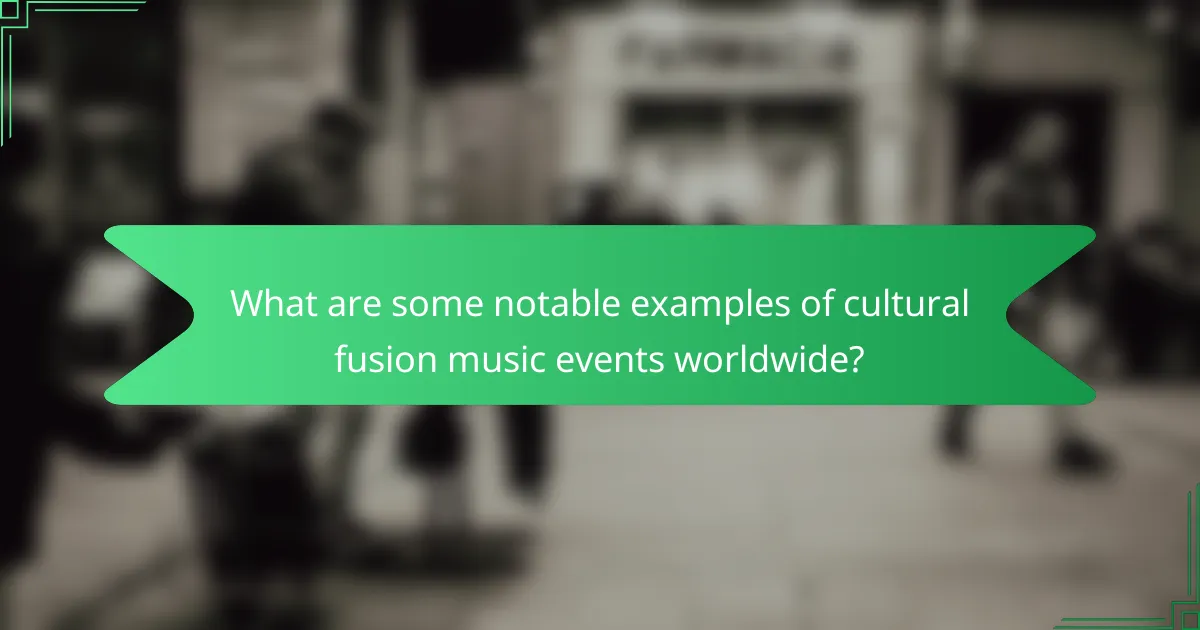
What are some notable examples of cultural fusion music events worldwide?
Notable cultural fusion music events worldwide include the WOMAD Festival, the Montreal International Jazz Festival, and GlobalFest in New York. These events showcase diverse musical styles and promote cross-cultural collaboration. For instance, WOMAD features artists from various genres, blending traditional and contemporary sounds. The Montreal International Jazz Festival highlights jazz influences from around the globe, while GlobalFest focuses on world music, celebrating multiculturalism through performances. Each event reflects unique regional influences, fostering a global appreciation for cultural diversity in music.
How have events like the World Music Festival evolved over the years?
Cultural fusion music events like the World Music Festival have evolved significantly, reflecting changing global trends and influences. Initially focused on local traditions, these events now showcase diverse genres and artists from various cultures.
Over the years, the integration of technology has transformed performances, enabling live streaming and virtual participation. This shift has broadened accessibility, allowing audiences worldwide to engage with the music.
Additionally, collaborations between artists from different backgrounds have become more common, enriching the musical landscape. For instance, hybrid genres like worldbeat and fusion have emerged, attracting new audiences and promoting cultural exchange.
Finally, sustainability has gained importance in event planning, with many festivals now prioritising eco-friendly practices to minimise environmental impact. This evolution demonstrates the dynamic nature of cultural fusion music events and their ability to adapt to contemporary issues.
What makes the Global Fusion Festival a unique experience?
The Global Fusion Festival offers a unique experience through its blend of diverse musical genres, cultural performances, and interactive workshops. This event showcases artists from various backgrounds, promoting cross-cultural collaboration and understanding. Attendees enjoy a vibrant atmosphere enriched by food, art, and traditions from around the world. The festival’s commitment to inclusivity and innovation sets it apart, making it a celebration of global unity and creativity.
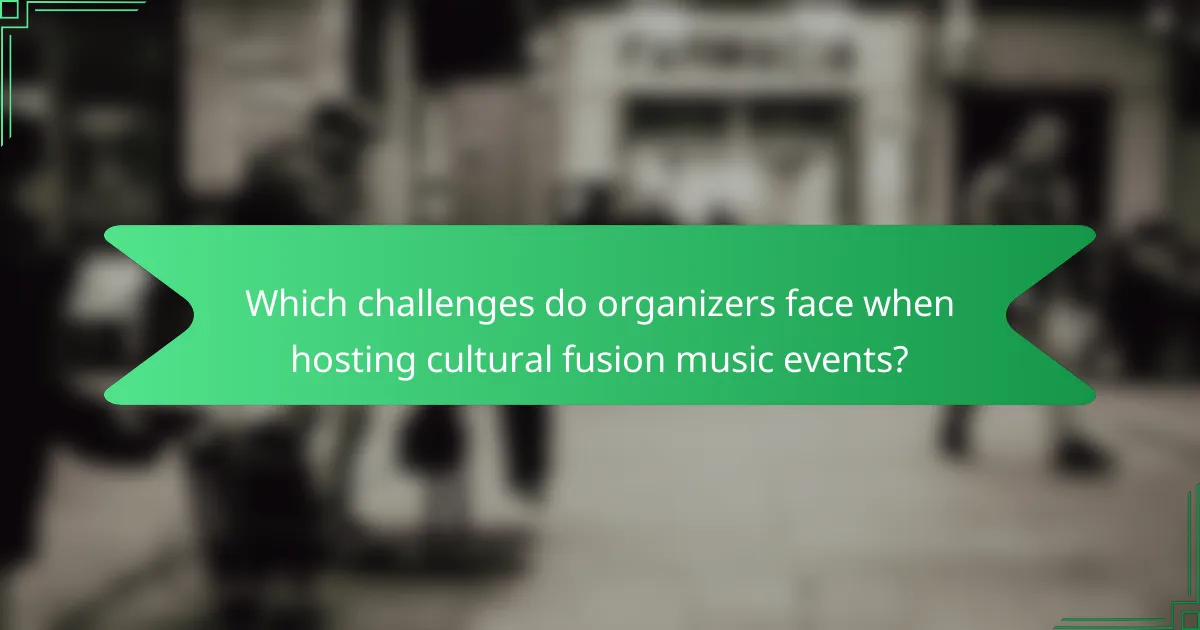
Which challenges do organizers face when hosting cultural fusion music events?
Organizers face logistical, cultural, and financial challenges when hosting cultural fusion music events. Securing diverse talent requires overcoming language barriers and ensuring cultural sensitivity. Budget constraints often limit venue options and marketing reach, impacting attendance. Additionally, navigating local regulations can complicate event planning. These challenges can affect the overall success and authenticity of the event.
How do cultural misunderstandings affect event planning and execution?
Cultural misunderstandings can significantly hinder event planning and execution. Misinterpretations of customs, traditions, and social norms may lead to conflicts or disengagement among attendees.
Effective communication is essential to bridge cultural gaps. Event planners should prioritise cultural sensitivity to ensure inclusivity. For instance, understanding dietary restrictions can enhance participant satisfaction.
Additionally, incorporating diverse perspectives enriches the event experience. This can attract a wider audience and foster collaboration among different cultural groups.
Lastly, feedback from participants can provide valuable insights. Analyzing attendee responses helps refine future events, addressing any cultural misalignments.
What logistical issues arise in managing diverse performances?
Logistical issues in managing diverse performances include coordination of schedules, cultural sensitivity, and resource allocation. Effective communication is essential to address differences in artistic expectations and audience engagement. Additionally, technical requirements may vary significantly across genres, complicating venue setup. Ensuring a cohesive experience demands careful planning and adaptability.
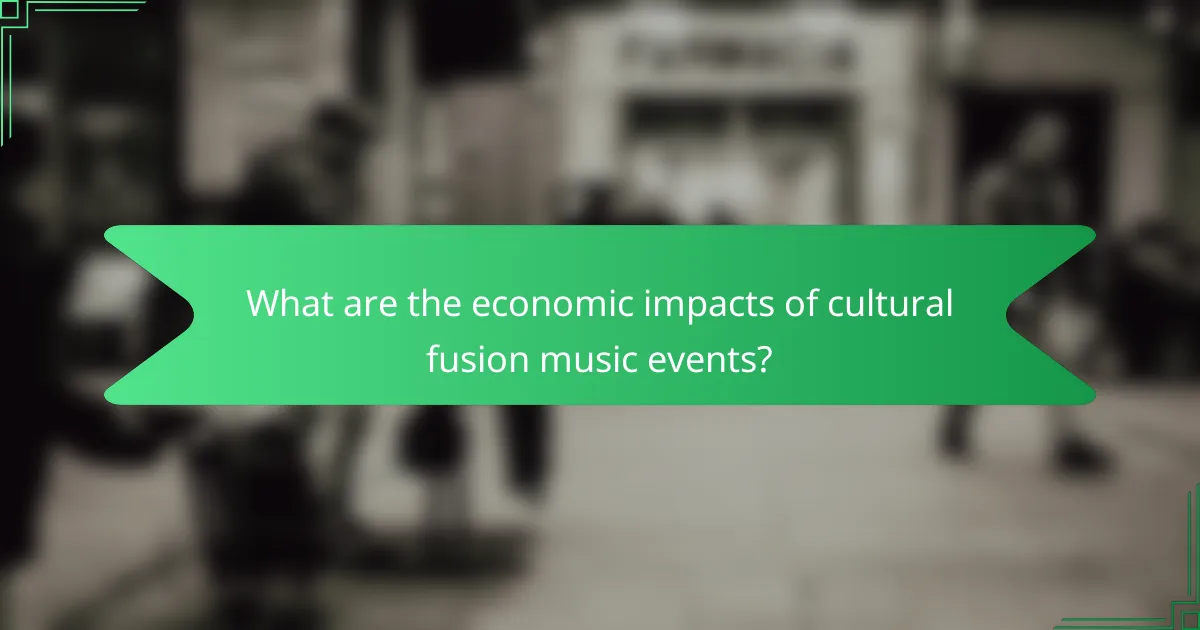
What are the economic impacts of cultural fusion music events?
Cultural fusion music events significantly boost local economies through tourism, job creation, and cultural exchange. These events attract diverse audiences, increasing spending in hospitality, transportation, and retail sectors.
For instance, a study indicated that fusion music festivals can generate over $10 million in local revenue. This economic impact fosters community development and strengthens cultural ties, enhancing the area’s global appeal.
Moreover, cultural fusion music events promote local artists, providing them with platforms to reach wider audiences. This exposure can lead to increased sales of merchandise and music, further contributing to the local economy.
In summary, the economic impacts of cultural fusion music events are profound, driving revenue growth and fostering cultural appreciation within communities.
How do these events contribute to local tourism and business?
Cultural fusion music events significantly enhance local tourism and business by attracting diverse audiences. These events promote cultural exchange, leading to increased foot traffic in local shops and restaurants. Additionally, they create opportunities for local artists and vendors, boosting the economy. For example, cities hosting such events often see a rise in hotel bookings and hospitality services, contributing to overall economic growth. The unique blend of cultures showcased can also elevate a city’s profile on a global scale, encouraging future tourism.
What funding opportunities exist for cultural fusion music initiatives?
Funding opportunities for cultural fusion music initiatives include grants from arts councils, music festivals, and cultural organizations. These sources often support projects that promote diversity and collaboration. For example, the National Endowment for the Arts offers funding for innovative music programs. Additionally, private foundations and corporate sponsorships may provide financial backing for specific events or artists. Crowdfunding platforms also enable community support for cultural fusion projects, allowing artists to engage directly with their audience.
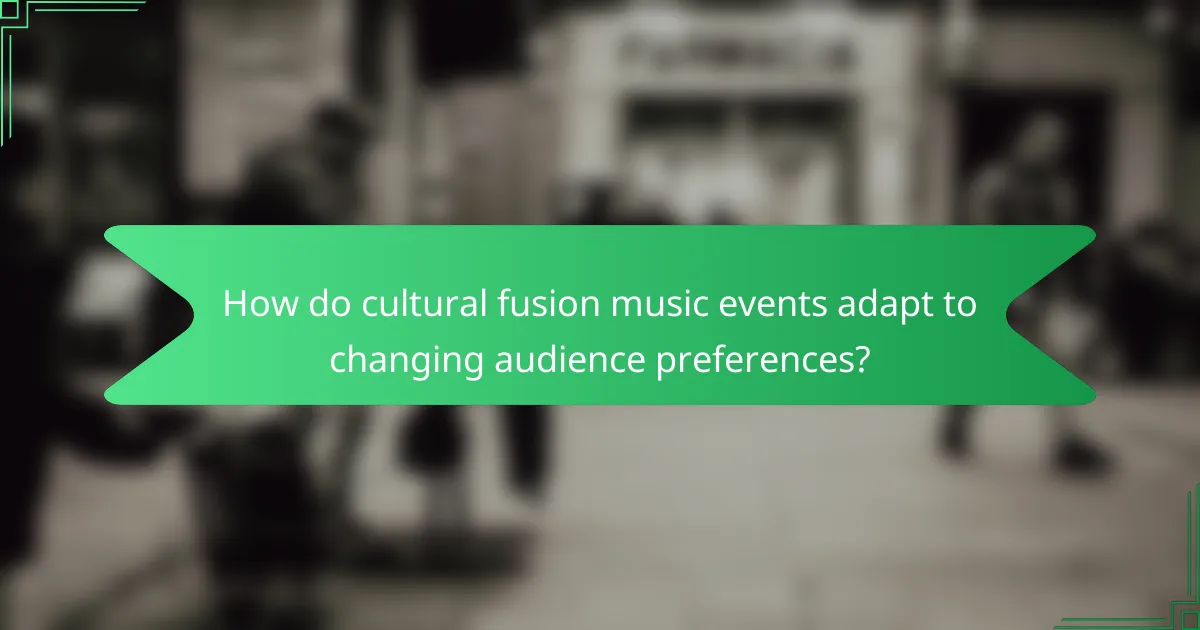
How do cultural fusion music events adapt to changing audience preferences?
Cultural fusion music events adapt to changing audience preferences by incorporating diverse genres and interactive experiences. This flexibility allows organizers to engage wider demographics and respond to evolving tastes.
Incorporating technology enhances audience participation. Live streaming and social media integration create real-time interactions, attracting younger audiences.
Cultural fusion events often showcase local and global artists, reflecting a blend of traditions. This approach promotes inclusivity and broadens appeal.
Feedback mechanisms, such as surveys and social media polls, help organizers understand audience preferences. Adjusting lineups based on this data ensures relevance and satisfaction.
What role does technology play in enhancing the event experience?
Technology significantly enhances the event experience by fostering engagement and accessibility. It enables live streaming, allowing global audiences to participate in cultural fusion music events. Advanced sound and lighting technologies create immersive atmospheres, enhancing audience enjoyment. Mobile apps facilitate real-time interaction, offering schedules, artist information, and social media integration. Additionally, data analytics provides insights into attendee preferences, helping organizers tailor future events. These innovations collectively elevate the overall experience, making events more dynamic and inclusive.
How have virtual events changed the landscape of cultural fusion music?
Virtual events have significantly transformed cultural fusion music by increasing accessibility and fostering global collaboration. These platforms enable artists from diverse backgrounds to connect and share their music without geographical constraints. As a result, cultural fusion music has seen a rise in innovative collaborations that blend various genres and traditions.
The virtual format allows for a wider audience reach, breaking down barriers to entry for both artists and fans. Events such as online festivals and live-streamed performances have become commonplace, showcasing talents from around the world. This shift has led to the emergence of unique sounds and styles, reflecting a rich tapestry of cultural influences.
Moreover, virtual events facilitate real-time interaction between artists and audiences, enhancing engagement and community building. This dynamic exchange fosters a deeper appreciation for cultural diversity in music. As a result, cultural fusion music continues to evolve, driven by the collaborative spirit nurtured in these virtual spaces.

What future trends can we expect in cultural fusion music events?
Cultural fusion music events will increasingly embrace technology, sustainability, and diverse collaborations. Virtual reality experiences will enhance audience engagement, while eco-friendly practices will shape event planning. Collaborations between artists from different genres will continue to redefine musical boundaries. Festivals will also prioritise inclusivity, reflecting global cultural diversity.
Which emerging genres are likely to influence future events?
Cultural fusion music events will increasingly influence future trends through collaboration, innovation, and cross-cultural exchanges. These events blend diverse musical styles, creating unique experiences that resonate globally. Artists from various backgrounds are collaborating, leading to fresh sounds and broader audiences. As a result, cultural fusion music events are shaping the future of music by promoting inclusivity and creativity.
How can organizers incorporate sustainability into their planning?
Organizers can incorporate sustainability into cultural fusion music events by prioritising eco-friendly practices. They should use renewable energy sources, minimise waste through recycling and composting, and source local food and materials.
Additionally, promoting public transportation and carpooling can reduce carbon footprints. Engaging with local communities can enhance cultural awareness while supporting sustainable economic practices. Using digital marketing reduces paper waste and enhances outreach.
What best practices can enhance the success of cultural fusion music events?
To enhance the success of cultural fusion music events, focus on audience engagement, diverse programming, and effective marketing strategies. Engaging local communities fosters a sense of belonging and authenticity. Incorporating various musical styles attracts a wider audience and enriches the experience. Leveraging social media and partnerships with influencers increases visibility and reach.
